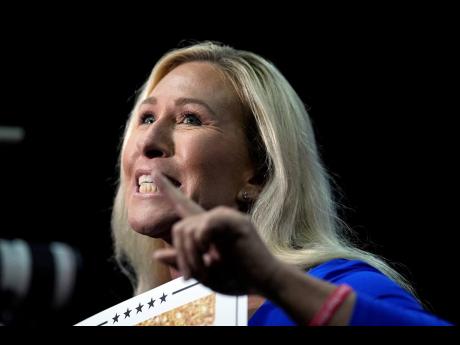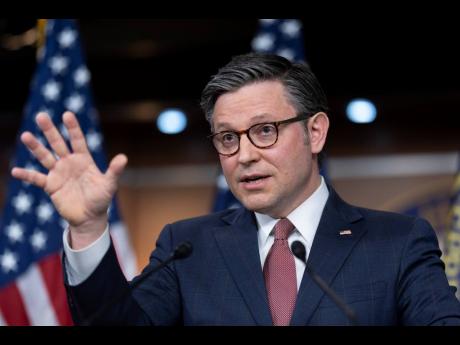House Speaker committed to advancing Ukraine aid
WASHINGTON (AP):
For over a month, House Speaker Mike Johnson has sat on a funding package that would send desperately needed ammunition and weaponry to Ukraine, mulling how best to gain a grasp of what is expected to be a difficult lift in the House.
The Republican speaker has indicated he will attempt to push for approval of tens of billions in wartime funding for Ukraine, as well as Israel, once the House returns in April. Yet it will be perhaps his most difficult task since he took the speaker’s gavel late last year.
“We’ll turn our attention to it and we won’t delay on that,” the Louisiana representative said of the Ukraine package at a news conference last week.
Still, Johnson has waited to act at a time when Russia is renewing its missile attacks on Kyiv. In Ukraine’s eastern regions, soldiers are running low on ammunition as they attempt to hold off a surge of Russian soldiers to the frontlines. European leaders and analysts are warning that the conflict could grow into a much larger clash that involves NATO allies and direct American military involvement if Russia prevails in Ukraine.
Johnson is facing dilemmas himself in Congress. Should funding for Ukraine’s government be loans or a typical grant? Should the US$95 billion package that the Senate approved for Ukraine, Israel and other allies be handled as one or broken into pieces? And how decisively should he push for the House to act when his own leadership position is being threatened?
Gregory Meeks, the top Democrat on the House Foreign Affairs Committee, called it “devastating” that the House has departed for a two-week break with the aid package left unresolved. He, along with many Democrats, called on Johnson to allow a vote on a Senate-approved bill.
“If you’re serious about helping Ukraine, you just put the bill on the floor and let’s vote – let the House have its will,” he said.
But hardline conservatives in the House, adamantly opposed to aid for Ukraine, are already frustrated with Johnson’s willingness to work with Democrats to pass legislation – so much so that it could cost him his job. Marjorie Taylor Greene, a far-right Republican from Georgia, has filed a motion to vacate Johnson as speaker and warned him not to put Ukraine funding on the House floor.
“He should not bring funding for Ukraine,” Greene told reporters on the Capitol steps just after she filed the motion to vacate.
Meanwhile, an old guard of Republican defence hawks has put increasing pressure on Johnson to advance an aid package in some form. Most Democrats have indicated support for the Senate-passed legislation. However, a growing number of Democrats have raised concerns about Israel’s deadly campaign in Gaza, and a significant number of them are expected to oppose any funding for offensive weaponry for Israel.
The dynamic leaves Johnson with a shifting and unpredictable House at a time when he will need to win broad, bipartisan support. Before becoming speaker, Johnson was deeply sceptical of approving funding for Ukraine and voted repeatedly against it. But now, occupying one of the most powerful positions in Washington, Johnson is poised to become a crucial ally for Kyiv at a time when America’s commitments abroad are in doubt.
“We understand the role that America plays in the world. We understand the importance of sending a strong signal to the world that we stand by our allies and we cannot allow terrorists and tyrants to march through the globe,” Johnson said.
Fond of quoting former President Ronald Reagan, Johnson has repeatedly cited “peace through strength” as one of his guiding principles. In private, he has indicated he will work towards a vote on Ukraine aid once the House returns in April, according to two people who discussed the private conversations on the condition of anonymity. But he has revealed little about how he intends to do it.


